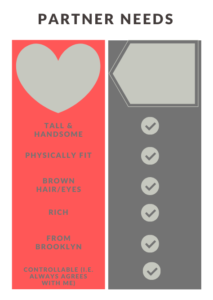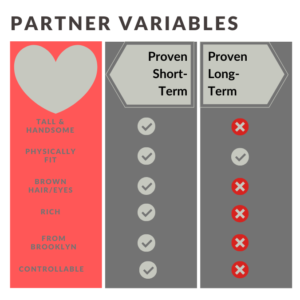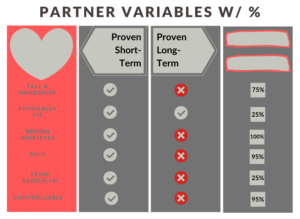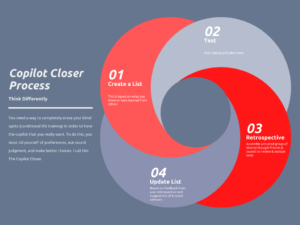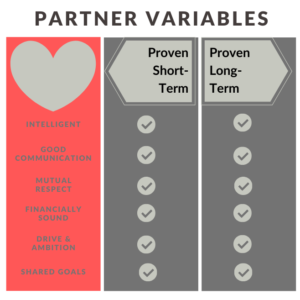The Copilot Closer Process: How to Select a Partner in Order to Live Out Your Best Life
Your life will be amazing. Or it will suck. It all depends on who you select as your life partner. Your life’s trajectory can be changed by either marrying the right person that helps you live your best life (the “copilot”), or the wrong person that leads you into a burning field of unrealized potential (the “kamikaze”). This concept is well-known and researched (
it).
Knowing that, you may be sitting next to your boyfriend right now and thinking, “eh, I think I’m more on the ‘kamikaze’ side of things…”
And that thought could be right. With the divorce/dissolution rate in America hovering between 40-50%, it seems like a fair amount of people are in the same position as you.
Why are people so bad at making important decisions? Making big decisions for yourself is a complicated process – especially for love. Remember, it’s only recent that humans started marrying for love. In fact, “loving someone” often took a backseat to family obligations, societal needs, or religion. Imagine being a woman who needs to get married because her family needs 3 cows to survive. Or having to marry someone rich a*#hole widower because your parents need the money and are too old to work the farm. This used to happen. All. Of. The. Time.
As a result, right now, all of us are in uncharted territories. Do you even know what you want in a life partner? And if so, how do you know those qualities are what is needed to live your best life for the next 50 years? How do you configure your profile on Match.com to optimize your chances of finding your copilot?
These questions about making decisions lead me to this research on the components of a sound decision and the correct way to approach it. And below are the loose interpretations of my findings.
Good Decisions Gone Awry
According to that study, the basis of sound decision-making is based on your preferences, your judgment, and your amount of choices affect the decision-making process.
In other words, how to decide which characteristics are important when selecting a life partner? Know yourself and know your blind spots.
You Can’t Only Depend on Others
Blind Spot #1: Preferences
A preference is a bias towards one thing over another. Since shared values and beliefs are not always expressed, a preference is a measurable way to group them together.
Most likely, you’ve acquired your preferences throughout life – think of it as your “nurture,” not your “nature.” The Four Agreements book by D.M. Ruiz refers to them as “agreements.” Either way, they’re usually things adults told you to do or believe – and you as a kid never asked why. Large scale examples are culture/nationality or religion, but there are many other smaller-scale examples too like men shouldn’t cry.
Why Preferences Heavily Influence Your Decision & Questions to Ask Yourself
-
Your homogeneous inner circle: As a study found, that if your inner circle of friends/family (framily) has a similar background and experiences as you, then that group doesn’t seek out or express contradictory opinions. As a result, “the group members develop extremely high levels of conformity and social identity.” This leads to framily members feeling they “are superior and that they do not need to seek outside information.“ Do you want to base such an important decision on such a small sample size with a limited amount of experience?
-
Weighty decisions: These preferences typically end up with a heavier weight than objective data. Are you sure your framily’s opinion on who you marry should be that important?
 |
| Photo by Alex Sorto on Unsplash |
“Girl, what do you think?”
“I don’t know, girl, what do you think?”
So what? OK, so you can’t trust your homogeneous framily. You can probably trust yourself, right?
You Can’t Only Depend on Yourself
Blind Spot #2: Judgement
Judgment is the ability to apply some sort of logic to your options. In order to make a sound judgment, using criteria with accuracy and consistency in which to apply the logic is needed.
Accuracy
You often overestimate something without knowing the truth. Notice how you feel the next time you board an airplane – are you scared of a plane crash? You may fear getting in a plane crash without knowing the real data (hint: you’re more likely to be attacked and killed by a shark). Now knowing this, will you be scared to get on a plane in the future? Of course, you will.
You’ll move onto overestimating – knowing the truth and still believing in your fear of death by a final-destination-style fiery plane crash….
…instead of that shark that you should really be scared of.
How does this relate to finding your soul mate? Review that checklist you have of your perfect copilot:
Yeah, it looks good at first glance, but it’s shaky because it’s a facade (a Facade List) – it’s less of what you really want and more influenced by preferences and overestimations. You’ve dated guys that checked off all of those boxes, but you hated them. Ugh. Especially that one guy. He was horrible.
And with superficial characteristics, there’s another thing to consider: how important they add up over time.
Consistency
Humans have a hard time understanding how many small decisions add up over time. It’s just too complex for our optimistic brains. The characteristics for a good partner that you have today may not be proven to be good for a partner in the future:
-
Contradictory: The problem with a Facade List is that it will change over time – and you may not like how it unfolds. Physical traits are important – you don’t want to marry someone who repulses you – but it’s not the only thing.
-
Admit to Unknowns: There are some things you just don’t know right now and cannot make a decision until you do know more (you won’t know this until you’re at least 30 years old, so if you’re reading this and in your 20s, continuing knowing everything and see how it works out for you).
But even if you have a good Facade List and have been making consistent dating decisions based on it, there will come a time when you have to choose on a final copilot.
Blind Spot #3: Choice
What is a choice? They are your options. Chris Rock once said, “Men are only as faithful as their options.” And that can also be applied to selecting a copilot in life.
Weighting Options: Selecting the Sure Bet
Because we know this decision is complex and important, we have to apply some sort of weight to each characteristic we want. You’re essentially weighting what the possibility of what the outcome will be:
The biggest issue is that weighting is not based on objective information. Again, there can be many different things that influence this rating, like preference or overestimation. Also, according to something called “prospect theory,” there’s a chance you will mess this all up (i.e. overweight “handsome” and underweight “physically fit” – possibly throw respect out the window).
And there are other things that can affect how you move forward with a choice:
-
Confidence: People use terms like “confidence” to describe uncertainty about their knowledge and terms like “likelihood” to describe their uncertainty about the world.” And whether or not they take action depends on their confidence.
-
Additional Choice: It throws off your original plan. If you only have 2 options, and then a 3rd enters, it may be the new shiny object but not the right one.
-
Loss Aversion: You hate losses more than you like possible gains. Should you hurry up and marry now instead of waiting for your prince charming?
All of this is really unfolding into a very complex problem. As a result, all of these things we’ve discussed rolls up into…
A Rushed Decision
All this lack of objective feedback makes it difficult to evaluate and update/refine your preferences, judgment, and choice abilities. Not to mention how much time all of this is taking. So you just get on with it and make a rushed decision.
 |
| (Photo by cindy baffour on Unsplash) |
I brought in an expert on this subject – my mom. She was married for 48 years to my father until he passed. She attributes their long marriage to how much they knew each other prior to getting married. But speaking on her observation of others, she agrees with the “fools rush in” mistake and agrees that most people really don’t take the time to get to know their potential partner. Or fully examine what their potential blind spots could be. Then they get married to them and go through some stuff, and think, “Who is this guy?”
Let’s go back to the couch. After reading this, do you know if that boyfriend sitting next to you is a kamikaze pilot for sure? Will you think, “Who is this guy?” in 2-3 years?
The Copilot Closer Solution
Part 1: Think Differently
Once one cycle is done – celebrate: Have a glass (or bottle) of wine for breaking out of your shell and moving towards life on your own terms! Continue this process for multiple cycles until it’s a Foundation List, which probably looks more like this:
Once you have a solid Foundation List, over time you’ll see how these characteristics play out over time:
-
Intelligent -> he will make wise decisions
-
Good Listener/Communication -> he will talk to you about fun things and tough stuff in a timely manner
-
Mutual Respect for Each Other -> both of you will listen to each other’s perspectives without demeaning one another
-
Financially Sound -> he will not invest in Ponzi schemes
-
Drive & Ambition -> he has enough grit & desire to always make money
-
Shared Goals in Life -> he will travel the world with you (if that’s what you want)
Part 2: Don’t Rush
When it comes to this process, take your time. Like with clinical tests, you cannot rush your trials. So don’t set up fake experiences to see how the other person reacts (despite what the movie How to Lose a Guy in 10 Days tells you) to move things along quicker. Just let things happen naturally and then reflect upon your own feelings. Was it ok that he reacted that way to this situation? What if he did this for the next 50 years of our life? Would I be ok with that?
You have to take the time to get to know yourself and what you really want. It’ll be that much easier to close in on that copilot!
The Copilot Closer Success Rate
What’s the success rate for the Copilot Closer Solution? This inadvertently worked for me – so a trial of 1 + a marriage = a success rate of 100% (so far).
And honestly, I lucked out with my husband because I didn’t rush through the decision. Not on purpose: I don’t like spending extended amounts of time with most people, which limited my dating experience. But even with limited dating experience, I created the time I needed to know what I really wanted. I unconsciously went through The Copilot Closer process. As a result, my Facade List at age of 25 turned into a Foundation List at 32 because of the time I took to refine it. And once I started to get to know my current husband, check-check-check.
The Point Is This:
When it comes to selecting a copilot for life, you need what’s best for you. And to know what that is, you have to know yourself by thinking differently than before. This decision is important because it can drastically affect your life. So don’t rush it.
And one can argue this is just one of many systematic approaches. It could work for you. Or maybe it won’t (because I’m not an expert). My goal is for people to start thinking differently in life. Ultimately, as you go through this process you’ll learn there is no single strategy that will guarantee success for every person (this is true for a lot of things in life). But if you’re stuck doing the same thing and getting the same undesired results, The Copilot Closer Solution is at least worth a try because it will get you to think differently about a very important decision. As Tony Robbins says, “All growth starts at the end of your comfort zone.”

